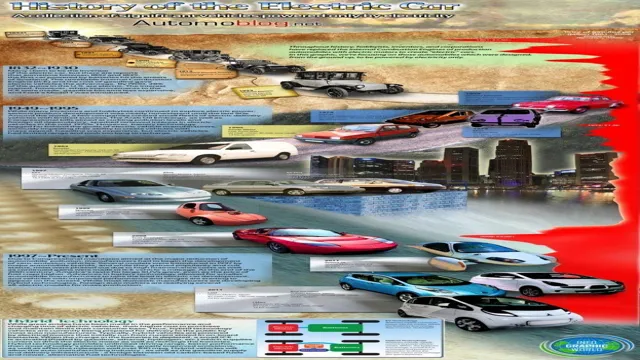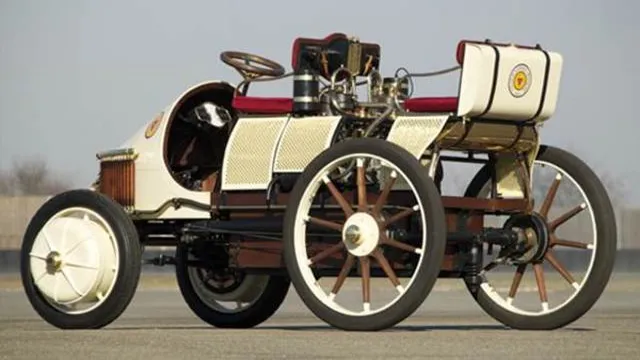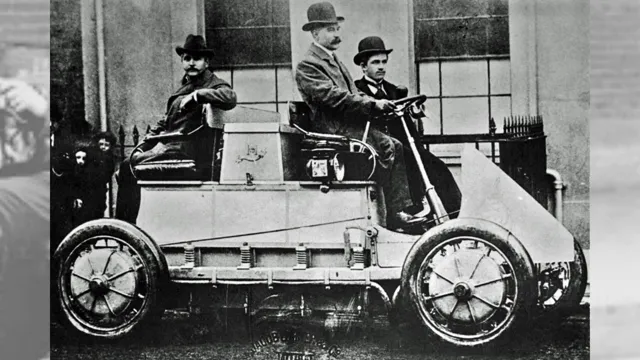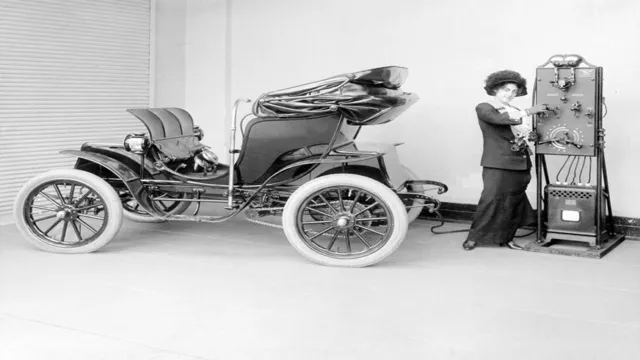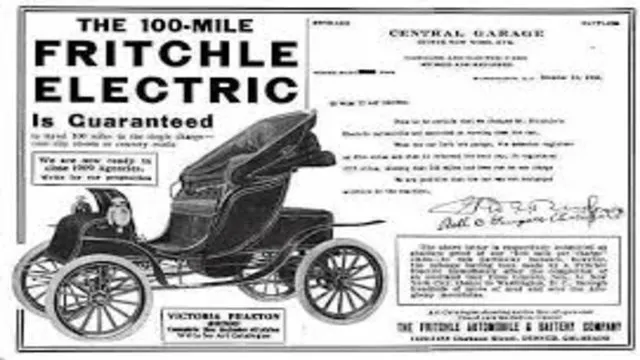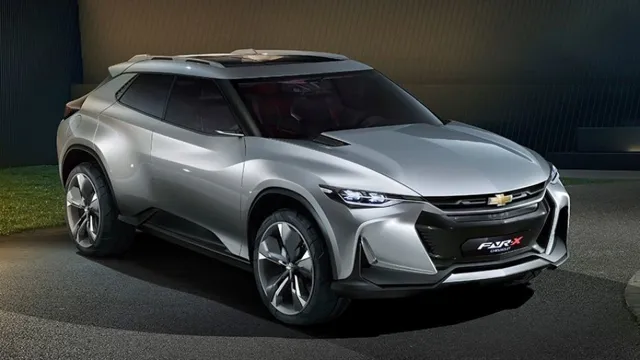The Electrifying Journey: Exploring the Fascinating History of Electric Cars in a PDF Format
Electric cars are becoming increasingly popular as people turn toward more sustainable forms of transportation. But did you know that electric cars date back to the 1800s? The history of electric cars is fascinating and often overlooked, but incredibly important in understanding the evolution of transportation. In this blog post, we will dive into the rich history of electric cars and explore their early beginnings, their decline in popularity, and their recent resurgence in the modern world.
So buckle up and join us on this electrifying journey through time.
Early Electric Cars
If you think electric cars are solely a product of recent times, you’re mistaken. The history of electric cars dates back to the late 19th century. In fact, the very first electric vehicle was created as far back as 1828 by Ányos Jedlik.
The early electric cars had limited range and speed, but they were much quieter, cleaner, and simpler to operate than their gasoline counterparts. Electric cars quickly gained momentum, and by the turn of the century, a third of all vehicles on the road in the US were electric. However, the emergence of gasoline-powered cars coupled with the relatively short range of electric cars spelled the end of their reign.
With the advent of mass production techniques and the development of electric car batteries, the excitement for electric cars began to grow again in the late 20th century. Today, we’re witnessing a new era of electric car evolution, and the history of electric cars continues to unfold. You can find interesting and in-depth information about the history of electric cars in a myriad of sources, including a history of electric car pdf.
Invention of the First Electric Car
Electric cars were not always a novelty. The first electric car was developed in the late 1800s, thanks to advancements in battery technology. These early electric cars had limited range and were expensive to produce, but they were quiet and emitted no harmful fumes.
Initially, electric cars were more popular than gasoline-powered cars because they were easier to operate, required no manual cranking to start, and were more reliable. However, the invention of the electric starter in gasoline cars made them more convenient to use, and the discovery of oil in the early 1900s made gasoline cheaper and more widely available. This led to the decline of the electric car and the rise of the gasoline-powered automobile.
Nonetheless, the groundwork for electric cars was laid over a century ago, and today, as we confront climate change, electric cars are once again gaining popularity due to their environmental benefits and technological improvements.
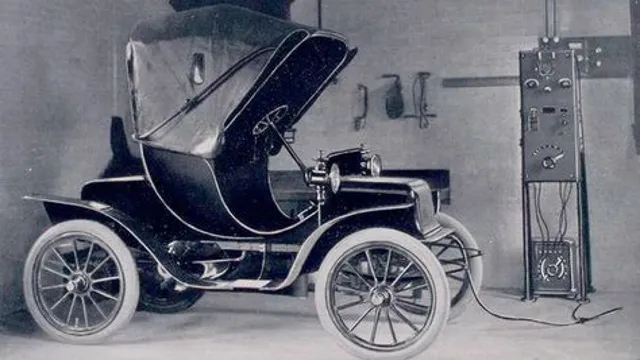
Popularization of Electric Cars in the Early 1900s
Early electric cars were all the rage in the early 1900s, before the popularity of gasoline-powered vehicles came to dominate the automotive industry. Many automakers, including Baker, Columbia, and Detroit Electric, produced electric roadsters, phaetons, and runabouts, which were popular among women drivers. Electric cars were quiet, easy to operate, and required minimal maintenance, making them ideal for city driving.
However, they were expensive, and the range was limited to around 30-40 miles on a single charge. Despite their limitations and relatively high cost, electric cars were seen as a promising alternative to the internal combustion engine in urban areas, and their popularity continued to grow until the 1920s. Today, as concerns about climate change and the environment grow more urgent, electric cars are once again becoming a popular choice for drivers who are looking for more sustainable and energy-efficient transportation options.
Post-War Decline and Resurgence
The history of electric cars has been cyclical, with periods of advancement and then retreat. After World War II, electric vehicles experienced a decline as gasoline-powered automobiles became more prevalent and their battery technology was not as efficient as it is today. However, as environmental concerns and advancements in technology grew, electric cars saw a resurgence in the 2000s.
Major car manufacturers like Tesla and Nissan offered electric vehicles with longer ranges, and governments implemented incentives for buying them. Now, with technological advancements and a growing focus on sustainability, electric vehicles are becoming increasingly commonplace and may soon overhaul the traditional gasoline-powered car industry. As the world grapples with climate change, the history of electric vehicles shows that they have the potential to play an important role in reducing carbon emissions and preserving our planet for future generations.
If you’re interested in learning more about the history of electric cars, you can find many PDF resources available online.
Factors Contributing to the Decline of Electric Cars
The decline of electric cars following World War II was largely due to the easy availability of oil and gasoline, which made gas-powered cars more convenient and cost-effective. However, with growing concerns about pollution and climate change, electric cars have made a resurgence in recent years. Factors such as advancements in battery technology, government subsidies, and increased availability of charging stations have helped to make electric cars a more viable option for consumers.
Additionally, consumers are becoming more aware of the benefits of electric cars, such as their lower carbon emissions and lower long-term costs. As electric cars continue to improve and become more accessible, it’s likely that their popularity will only continue to grow.
Recent Resurgence of Interest in Electric Cars
In the years following World War II, electric cars saw a sharp decline in popularity due to advancements in gasoline-powered vehicles. However, in recent years, we’ve seen a significant resurgence of interest in electric cars. This can be attributed to a variety of factors, including environmental concerns, technological advancements, and government incentives.
People are becoming more conscious of the impact their choices have on the environment, and electric cars are seen as a cleaner, more sustainable alternative to traditional gas-guzzlers. Meanwhile, advances in battery technology and charging infrastructure have made electric cars more practical and convenient than ever before. And with governments around the world offering tax credits and other incentives to encourage the adoption of electric cars, it’s no wonder we’re seeing a surge in sales.
Despite initial concerns about range anxiety and high costs, electric cars are quickly becoming a viable and attractive option for drivers looking to minimize their impact on the planet.
Electric Cars in the 21st Century
The decline of electric cars after World War II can be attributed to various factors, including advancements in gasoline-powered vehicles and the economic boom that followed the war. However, since the turn of the 21st century, electric cars have made a remarkable resurgence, driven by environmental concerns and advances in battery technology. These new electric cars are not only eco-friendly but also offer impressive range and performance, making them a viable alternative to traditional gasoline-powered vehicles.
With the increasing demand for sustainable transportation solutions, it is no wonder that electric cars have become a hot topic in the automotive industry. As more and more people turn to electric cars, we can imagine a future where they dominate the roads, offering a cleaner and greener way of getting around.
Environmental Impact and Future Outlook
The history of electric cars dates back almost 200 years, and their impact on the environment has been a major concern. Electric cars have proven to be far cleaner than traditional gasoline-powered vehicles, emitting far fewer greenhouse gases and other harmful pollutants. Moreover, advances in battery technology have helped to make electric cars more affordable and practical, and their popularity has been growing steadily in recent years.
However, there are still challenges to be addressed, such as the availability of charging infrastructure, the costs associated with manufacturing batteries, and the limited range of some vehicles. Nevertheless, the future looks bright for electric cars as more and more people become aware of their benefits and governments around the world enact policies to promote their adoption. As more consumers turn to electric cars, the demand for resources such as lithium and cobalt will also increase, leading to a need for more environmentally sustainable mining practices.
Overall, the history of electric cars has been marked by both challenges and successes, and their future impact on the environment will depend on continued innovation and action. So, if you’re interested in the history of electric cars, there are plenty of resources available, including a variety of PDF documents that detail their impact on the environment and their potential for a cleaner, greener future.
Environmental Advantages of Electric Cars
Electric cars have been touted as an environmentally friendly alternative to traditional gasoline-powered vehicles. They emit fewer greenhouse gases, which reduces air pollution and slows the rate of climate change. Even though electric cars currently account for only a small fraction of the global car market, we can expect their popularity to increase in the future.
Economies of scale and advancements in technology will drive down the cost of electric vehicles, making them more accessible to the general public. In the long run, this will only increase the environmental benefits associated with these vehicles. Using an electric car is not just a personal choice; it is a choice that can have far-reaching effects on the environment.
The faster we adopt this technology, the sooner we can reduce our dependence on fossil fuels and transition towards a greener, cleaner future.
Obstacles Facing Widespread Adoption of Electric Cars
Despite the growing popularity of electric cars, there are still some environmental obstacles that prevent their widespread adoption. While electric vehicles produce zero emissions on the road, the manufacturing process of their batteries, along with the source of the electricity used to charge them, still has a negative impact on the environment. Another obstacle is the cost of electric cars, which is still relatively high compared to traditional vehicles.
However, there is a bright future for electric cars as advancements in battery technology and government incentives drive down prices and improve performance. Additionally, companies are investing in renewable energy sources, such as wind and solar power, to provide clean energy for charging electric cars. Overall, there is a lot of potential for the widespread adoption of electric cars in the future, but it requires continued investment in sustainable technology and public policy that supports renewable energy development.
Conclusion
So, there you have it, the electrifying history of electric cars. From humble beginnings in the 1830s to the mass production and widespread adoption we see today, the electric car has come a long way. It’s safe to say that this trend is not just a passing fad, but a fundamental shift towards a cleaner, more sustainable future.
Whether you’re a hardcore gearhead or just someone who wants to do their part for the environment, the electric car is definitely worth paying attention to. And who knows, maybe someday we’ll be looking back at the gas-guzzling days of the past and wondering how we ever put up with such dirty, noisy, and inefficient transportation!”
FAQs
What is the history of electric cars?
The history of electric cars dates back to the 1830s, when inventors began experimenting with battery-powered vehicles.
Why are electric cars becoming more popular?
Electric cars are becoming more popular due to their environmental benefits, lower operating costs, and advancements in technology leading to longer driving ranges and faster charging times.
Are there any disadvantages to owning an electric car?
Some disadvantages of owning an electric car may include higher upfront costs, limited driving range, and the need for infrastructure to support charging stations.
What are some of the current advancements in electric car technology?
Current advancements in electric car technology include developments in battery technology, more efficient electric motors, and software advancements enabling advanced features like self-driving capabilities.
Where can I find a comprehensive guide to the history of electric cars in PDF format?
A comprehensive guide to the history of electric cars in PDF format can be found through a simple online search or by accessing academic databases such as JSTOR and Google Scholar.

